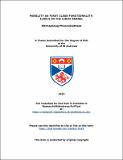Mobility as first class functionality : ILNPv6 in the Linux kernel
Abstract
Mobility is an increasingly important aspect of communication for the Internet. The usage of handheld computing devices such as tablets and smartphones is increasingly popular among Internet users. However, the current Internet protocol, IP, was not originally designed to support mobility over the Internet. Mobile users currently suffer from connection disruption when they move around. Once a device changes point of attachments between different wireless technology (vertical handoff) e.g. from WiFi to 3G, the IP address changes, and the bound session (e.g. TCP session) breaks. While the IETF Mobile IPv4 (MIPv4) and Mobile IPv6 (MIPv6) solutions have been defined for some time, and implementations are available, they have seen little deployment due to their complexity and performance.
This thesis has examined how IP mobility can be supported as first class functionality, i.e. mobility can be enabled through the end hosts only, without changing the current network infrastructure. Current approaches such as MIPv6 require the use of proxies and tunnels which introduce protocol overhead and impact transport layer performance. The Identifier-Locator Network Protocol (ILNP) is an alternative approach which potentially works end-to-end, but this is yet to be tested. This thesis shows that ILNP provides mobility support as first class functionality, is implemented in an operating system kernel, and is accessible from the standard API without requiring changes to applications. Mobility management is controlled and managed by the end-systems, and does not require additional network-layer entities, only the end hosts need to be upgraded for ILNP to operate. This work demonstrates an instance of ILNP that is a superset of IPv6, called ILNPv6, that is implemented by extending the current IPv6 code in the Linux kernel. A direct performance comparison of ILNPv6 and MIPv6 is presented, showing the improved control and performance of ILNPv6, in terms of flow continuity, packet loss, handoff delay, and signalling overhead.
Type
Thesis, PhD Doctor of Philosophy
Collections
Items in the St Andrews Research Repository are protected by copyright, with all rights reserved, unless otherwise indicated.

